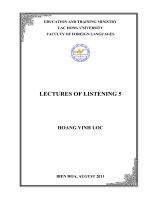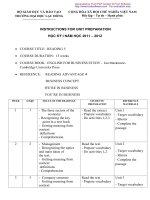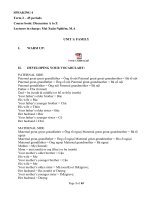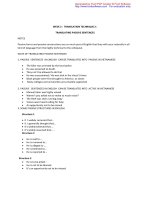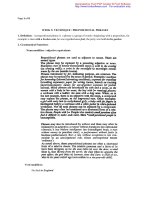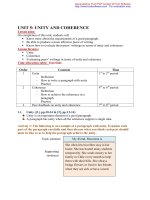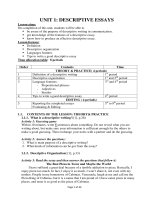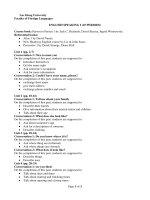Com SPEAKING 5 VB1 PTLINH WEEK 2
Bạn đang xem bản rút gọn của tài liệu. Xem và tải ngay bản đầy đủ của tài liệu tại đây (146.04 KB, 3 trang )
ĐỀ CƯƠNG BÀI GIẢNG MÔN SPEAKING HỌC KÌ 5 (VB I)
TUẦN 2 (Từ 22/08/2011 đến 28/08/2011)
Unit 2: SUCCESS (1LT - 3TH)
LESSON AIMS:
By the end of the lesson, students will be able to:
Learn how to present and participate in discussion
Develop fluency
Expression their opinions about “Success” in English naturally
CONTENTS:
I.
Classroom activities
A.
Warm-ups (Doing homework assignments)
B.
Pre- Speaking activities
1.
What does “success‟ mean to you?
2.
What makes a person success?
C.
While – Speaking Activities
1. Read the following quotations of success and discuss them
a. If at first you don‟t success, try, try, a couple of times more. Then quit:
there‟s no sense in making a fool of yourself. (W.C. Fields, 20th century
American actor and comedian)
b. Early to be, early to rise, Never get tight, and – advertise. (Anonymous)
c. Failure teaches success (Proverb)
d. Success is not measured by what one brings, but rather by what one
leaves. (Anonymous)
e. It takes twenty years to make an overnight success. (Eddie Cantor, 20th
century American entertainer)
2. Look at Abraham Lincoln „s resume and say what made him successful?
Date of birth: February 12, 1809
Place of birth: U.S. A
Father: Farmer. Moved frequently
Mother: Died when he was nine. Brought up by step mother.
Home: One-room cabin. Dirt floor
Education: One year of school
1828
: Went to Illinois alone. Took various jobs: a storekeeper, a laborer, a postman
Borrowed books and read all night. Taught himself law.
1834
: Elected to the State of Illinois Legislature
1847
: Seat in U.S Congress
1861-1865: President of the U.S. A
Died
: April 15, 1865
3.
In groups, answer the following questions
a. What is meant by success in school life, in job, in family life?
b. Do you know anyone who failed in school but became successful later?
c. What problems can success bring?
d. Think of a successful people you know who were born with a silver spoon
in their mouth. How do you feel about these people?
e. Do you know anyone who has been a success because of an education at
the university of life?
D.
Post – Speaking Activities
Read the following text and answer the questions
A PERSONAL PREFACE
My father was a quiet man. He had been rector of the same country parish in Kildare in Southern
Ireland for forty years when he retired, aged seventy-two. He was tired by then, understandably.
For the last fourteen of those years he had also been Archdeacon of the Diocese. He died two
years later.
I was in Paris at a business conference when I heard that he was dying. I flew back to Ireland ,
but he was unconscious by the time I got there and died the next day. His funeral, like all
funerals in Ireland, was arranged for the day after tomorrow, a quiet family affair, back in the
country church he had served for so long.
I was very fond of my father, but disappointed in him. He had turned down big city parishes, had
settled for a humdrum life in the same little backwater. His life seemed to be a series of boring
meetings and visits punctuated with the unchanging rhythm of Sundays, with old Mrs. Atkinson
and Eddie to lunch in the rectory afterwards. As a teenager I resolved never to go to church
again, once I led my own life, and never to be poor again.
And so it was that, much to the amazement of my friends and family, I became an oil executive
and was posted to the Far East to be in charge of Marketing in Sarawak – a job and a country
both unknown in the rectory. I had a good time in Malaysia, mostly spending money and
drinking too much beer. I came back fat and rather sleek, and also engaged, to a beautiful
English girl whom I had met in Kuala Lumpur.
She didn‟t think much of an oil executive‟s life or of her predestined role as an oil executive‟s
hostess, so I switched to the newly-discovered world of Business Studies, going to the United
States to pick up another degree and coming back to the infant London Business School. Soon I
was a professor, gallivanting around to conferences, consulting, lunching, dining, on the edge of
big time. A book had been published and articles galore. We had two young children, a flat in
town, and a cottage in the country. More than that, I was tremendously busy, with a diary
crammed with engagements. Success!
It was with these thoughts in minds that I followed the hearse down the country roads to my
father‟s funeral; a quiet end for a quiet man, I reflected. A pity that he never really understood
what I was doing . When I became a professor I remember my mother‟s reaction to the news was
to ask if this meant that I could now spend more time with the children.
Suddenly I noticed that we seemed to have a police escort; the local police had decided unasked
to clear our route for the last few miles to church. A nice compliment to a Protestant vicar in
rural Catholic Ireland, but just as well because it was hard to thread our way between the queues
of cars trying to get to the little country church. The place was packed, overflowing. How had
they heard? He had only died the day before yesterday and there had just been the one notice in
the paper.
The choir looked old, too. Dressed in the little-boy surplices that I remembered from long ago
but with older faces. I remembered some of them. Choir boys and choir girls reassembled from
all the corners of Ireland, or from England, too. They had dropped everything to be there. The
Archbishop too, supposed to be in hospital, and still propped on a stick, was there to say to all of
us how special my father had been and how he would be missed but remembered forever by so
many whose lives he had touched.
As i stood by his grave, surrounded by people he helped to marry and whose children he had
later baptized and then seen marry in his church in their turn, as I saw the tears in the eyes of the
hundreds of people who had come from everywhere to sat farewell to this “quiet” man, I turned
away and began to think.
Who, I wondered, would come to my funeral with tears in their eyes? What is success and who
was successful, me or my father? What is one‟s life for, and what is the point of our existence in
this philosophy? They are not exactly new questions. I had studied philosophy. I knew the
theories. I had never applied them to myself before. Not seriously.
1.
2.
3.
4.
5.
II.
1.
Who is Charles Handy?
What was his father?
What event does Handy describe?
Why was Handy surprised?
What effect did the event have?
Homework assignments
Discuss these questions in groups after reading the above reading text
a. How had Handy defined success before his father‟s funeral?
b. How do you think the event changed his life?
c. In what way do you think his father was successful?
2. Do you agree or disagree with the following statements?
We are totally responsible for what happen in our lives – we should never blame other people or
circumstances for our own mistakes and misfortunes.

